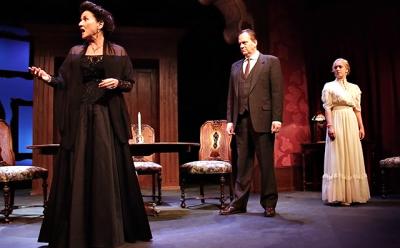Hampton Theater Company Probes Universal Themes in ‘Inspector’

In a review of a recent BBC adaption of “An Inspector Calls,” The Guardian observed that if, in the play’s final speech, you replace the name of its deceased character Eva with the name of the 3-year old Syrian boy whose body washed up recently on a beach in Greece, the play’s universal themes become even more relevant to the world as we know it today.
The words set down by the playwright J.B. Priestley 70 years ago would read as follows: “There are millions and millions of Aylan Kurdis left with us, with their lives, their hopes and fears, their suffering and a chance of happiness, all intertwined with our lives and what we think and say and do. We don’t live alone. We are members of one body. We are responsible for each other.”
There is probably no more valid point to make about why this play endures and why theatergoers should consider seeing it. It will open tonight at the Hampton Theatre Company in Quogue.
Apart from its pertinence to current events, the play is also a thrilling mystery. It takes place on one momentous evening, April 15, 1912, the same night as the sinking of the Titanic.
As one family celebrates in Edwardian fashion at a house in a northern industrial town, a storm cloud appears in the arrival of Inspector Goole, who is investigating the suicide of the previously mentioned Eva. He comes armed with information that quickly begins to unravel the mirage of their charmed life and dims the happiness stemming from their daughter’s advantageous engagement.
“An Inspector Calls” debuted in 1945 and was adapted for film in 1954. Thereafter, its indictment of the hypocrisy of the English social structure was forgotten until a 1992 adaptation by Stephen Daldry, which ran in London and New York.
Priestley, who was from Yorkshire, England, wrote many plays and dramatic adaptions, including the “Time” plays, which were influenced by J.W. Dunne’s theory of time: “Dangerous Corner,” “Time and the Conways,” and “I Have Been Here Before.” During World War II, his BBC “Postscripts” broadcasts were almost as popular as Winston Churchill’s. He rejected his country’s offer of a knighthood and a peerage.
By trimming Priestley’s original script into a tighter, fasterpaced version, Sarah Hunnewell, the executive director of the Hampton Theatre Company and the play’s director, promises a taut and “gripping piece of theater.” The cast includes Edward Brennan as the inspector, Daren Kelley as the family patriarch Arthur Birling, Susan Galardi as his wife, Sybil, and Amanda Griemsmann and Anthony Famulari as the newly betrothed couple. Adding to the mix is Spencer Scott, who plays the Birlings’ troubled son.
Ms. Galardi, a North Haven resident whose day job is director of communications for the Parrish Art Museum, saidshe was thrilled to be participating in the production and playing Mrs. Birling in her debut with the company.
“I didn’t know the play,” she said. “I thought it was a polite drawing-room piece. But once I started reading it, I couldn’t put it down. It’s a multilayered psychodrama based on themes that are painfully relevant today — the inequity of the valuesplaced on human lives, where our responsibility for one another begins and ends, the effect that a casual, seemingly arbitrary interaction may have on another person.”
The family members are what we would call today 1-percenters. The woman who is dead is from the working classes, which they believe were put on the earth to serve them. Mrs. Birling “will do whatever it takes to hold on to her position. She’s the matriarch who is keenly aware, yet in complete denial, bound by both pride and fear, ego and insecurity.” Ms. Galardi said the role had given her a lot to play with and marked a change from her experience in comedy and musicals.
“Mrs. Birling is also the character who is least intimidated by the inspector, so it was exciting when I discovered her Achilles heel‚ the chink in the armor that grows and tears her apart‚ that makes her human despite her cold, calculating, judgmental nature. All in all, it is a really fun role to play.”
Peter-Tolin Baker designed the set and Diana Marbury did the set decoration. Lighting is by Sebastian Paczynski, costumes by Teresa LeBrun.
The play will run on Thursdays and Fridays at 7 p.m., Saturdays at 8 p.m., and Sundays at 2:30 p.m. through Nov. 8. Tickets are available at hamptontheatre.org, or by calling OvationTix. Season subscriptions and other packages are available on the site as well.
